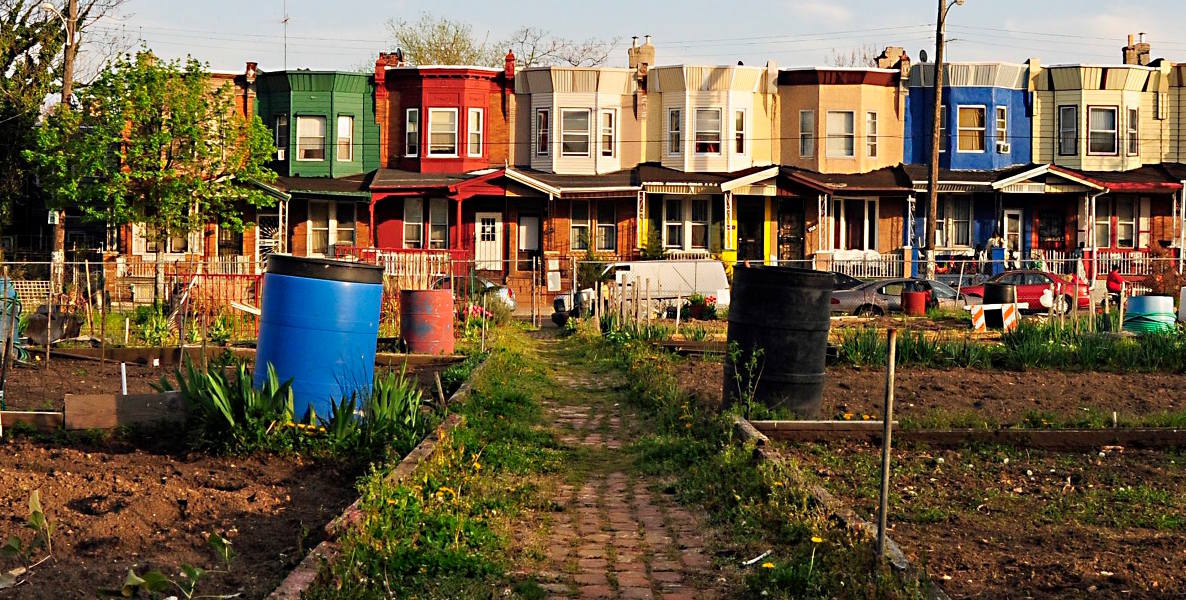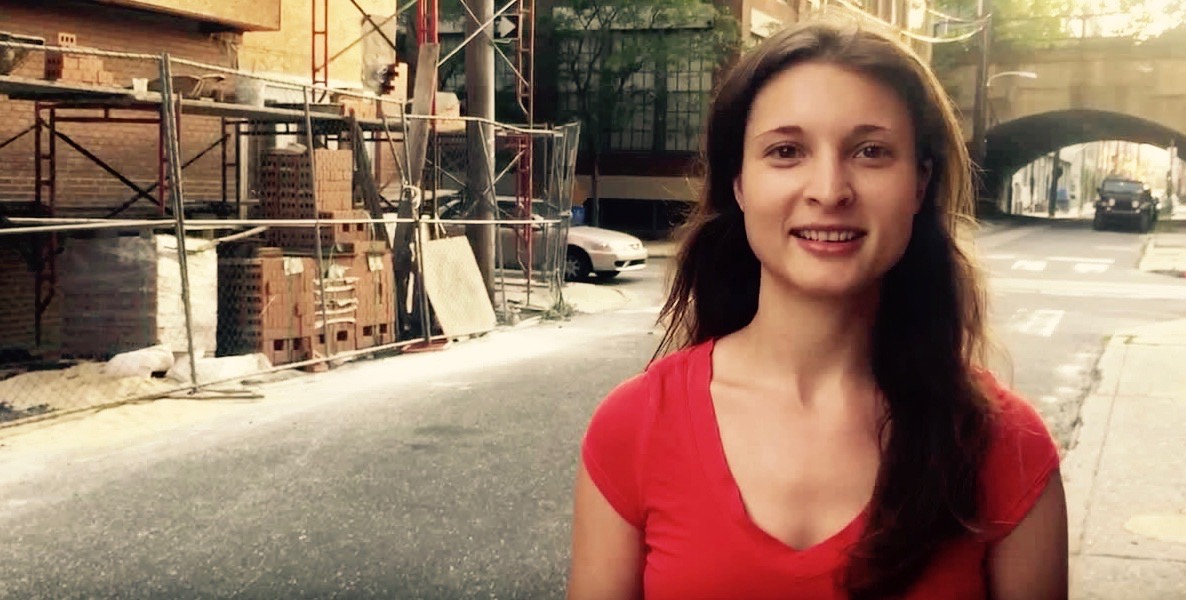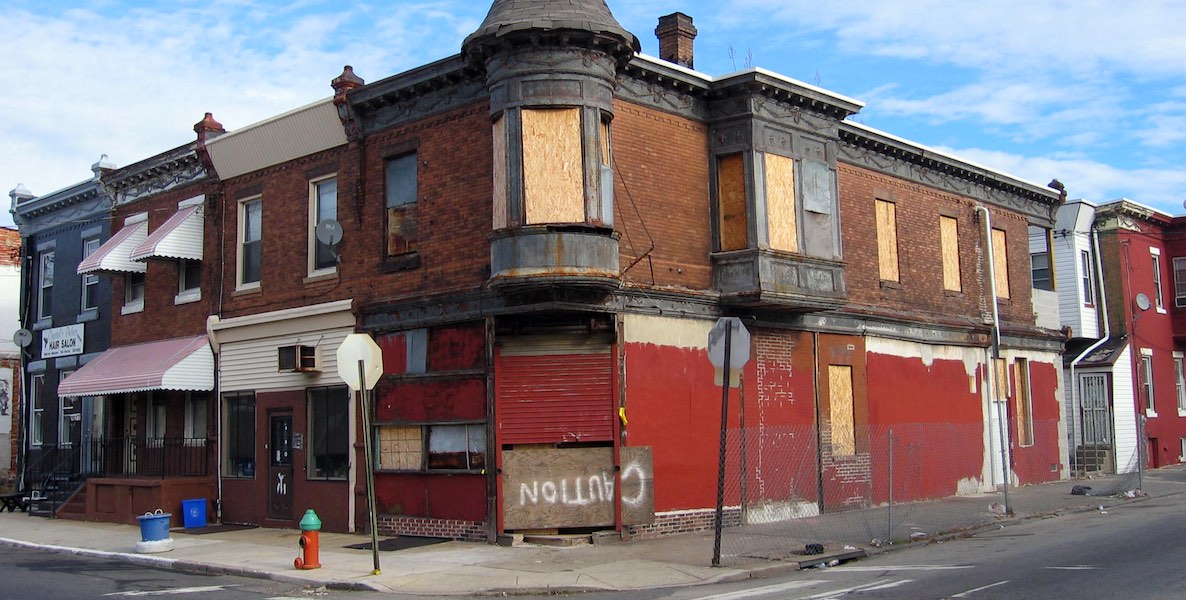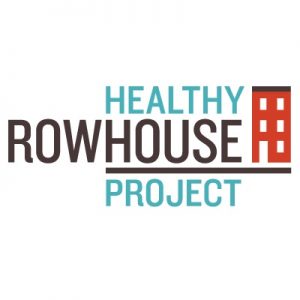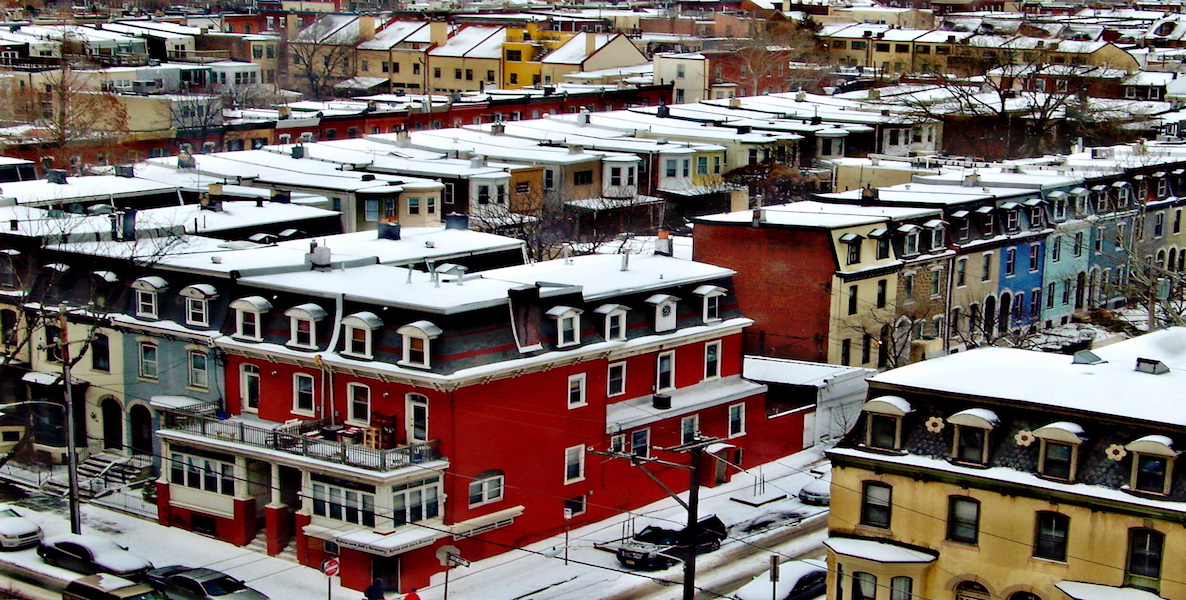In the run up to last year’s Mayoral election, the folks at the then brand new Healthy Rowhouse Project spent hours trying to convince candidates and local officials about one single but potentially city-changing idea: That for Philly to remain livable for all, the city needs innovative ways to help low-income homeowners stay in their houses.
Turns out, people actually listened.
Last May, Council President Darrell Clarke pushed through a slight increase in the real estate transfer tax to service a $100 million bond that would provide $60 million in repair grants to 5,500 homeowners on the city’s waiting list for city-funded repair grants. The other $40 million he intended for a new loan program aimed at helping slightly higher-income homeowners.
Tomorrow, Clarke and Mayor Kenney were scheduled to join Healthy Rowhouse in discussing the loan program that would create for the first time a renewable income source to help poor residents fix their houses. The loan program—up to $34,000, at low-interest—would be a radically new approach to affordable housing in the city, and one of only a few like it around the country. The goal is to preserve “naturally-occurring affordable housing”—that is, housing that is affordable without any government subsidy. Because, as Healthy Rowhouse’s Karen Black has said, “The most affordable house is the one someone is living in right now.”
![]() Philly’s rowhomes are, for many, a signature of city living. They connect us to each other—literally—and to our communities, and the fate of our neighbors’ home is often linked to our own, again literally: An abandoned house decreases the property value of other houses on the street by $8,000. More than that, deteriorating houses create a host of problems that go beyond real estate: Leaking roofs, moldy walls, bug-infested rooms cause or exacerbate chronic health problems, especially in children and the elderly. That can force people to leave their homes, upending communities—and making way for the kind of gentrifying development that changes what so many love about their neighborhoods.
Philly’s rowhomes are, for many, a signature of city living. They connect us to each other—literally—and to our communities, and the fate of our neighbors’ home is often linked to our own, again literally: An abandoned house decreases the property value of other houses on the street by $8,000. More than that, deteriorating houses create a host of problems that go beyond real estate: Leaking roofs, moldy walls, bug-infested rooms cause or exacerbate chronic health problems, especially in children and the elderly. That can force people to leave their homes, upending communities—and making way for the kind of gentrifying development that changes what so many love about their neighborhoods.
Until now, the city’s solution to this problem has been to offer home repair grants through Basic Systems Repair Program, Adaptive Modifications Program and Weatherization Assistance Program, mainly to residents who are at or below 150 percent of poverty. But that money is never enough. The $60 million will clear out a years-long waiting list, but that list will almost immediately grow back—with no guarantee that there will continue to be funding. That’s why Healthy Rowhouse—using a model launched in Detroit and Cleveland Heights that we wrote about in May—has pushed for a loan program that could unleash millions of dollars every year to low-income homeowners to fix their houses all over town.
“The need is so great, and the public dollars so finite that we keep running out of money,” says Black. “We can’t give it all away for free anymore.”
According to Healthy Rowhouse’s research, 30 percent of people who need help with repairs make between $36,000 and $85,000 in their household. But in Philadelphia, those people are often unable to get home repair loans. Between 2012 and 2014, 24,000 people applied for bank help with repairing their homes; of those, 15,000 were turned away. That’s 62 percent who were denied loans—well above the national average of 37 percent.
Lenders, Black says, blame poor credit and low incomes for their decisions. And, indeed, Philly has more low-income homeowners than any other city. Clarke, in the spring, noted that 110,000 homes in Philly are owned by residents with annual incomes of less than $35,000. (These are the folks who would qualify for grants.) Many homeowners are also elderly: Some 78 percent of Philadelphians over 60 own their own homes. As their income and health deteriorate, so do their homes—exacerbating both problems, and increasing the risk that their children will inherit little more than a run-down shell.
Under the tentative plan that Healthy Rowhouse and the city planned to discuss this week, banks would bear no risk. Instead, the city would guarantee repayment of $40 million, in exchange for a bank or banks giving out $80 million in loans to moderately poor homeowners. That is enough to account for an exceptionally high 50 percent default rate; in Cleveland Heights, a similar program saw a 6 percent default rate, which Black suspects is more in line with what might happen here. For the first year, Black expects 1,000 loans; the next year, 5,000. Eventually, as they evaluate how well the program works, she says the numbers of loans can grow.
The way it works is this: Homeowners interested in applying for a loan would first be sent to a financial counselor, to help them better understand their finances, and carefully consider the obligations and risks of the loan. If their income is between $36,000 and $85,000, they could receive a loan from a private lender for up to $34,000 to fix up their homes. At a monthly payment of $90, they would pay a $10,000 loan off in 10 years. (If they sell the house before 10 years, the bank gets its money out of the sale price.) If a homeowner defaults on a loan, the bank would still get paid, out of that $40 million in contingency money. Meanwhile, money that is repaid would then be loaned out again to additional homeowners—again with no risk to the bank.
Between 2012 and 2014 in Philadelphia, 24,000 people applied for bank help with repairing their homes; of those, 15,000 were turned away. That’s 62 percent who were denied loans—well above the national average of 37 percent. Under the plan that Healthy Rowhouse and the city plan to announce this week, banks would bear no risk.
The loans will not be interest-free, as they are in Detroit. But Black says Healthy Rowhouse is talking to lenders about keeping the rate around 3 percent—far enough below market rate that banks are not really going to profit from it. Instead the incentive for banks—besides good will—is that it will help them to fulfill a legal mandate to provide financial assistance to low-income people and low-income areas under the Community Reinvestment Act of 1977. “Banks are already obligated to do this,” says Black. “This is an innovative way to do it, with no risk.”
The loan program will not eliminate the need for the existing city programs. People whose household income is below 150 percent of poverty, or $36,000 for a family of four, will still qualify for grants, when they are available. This is a separate pool of recirculating funds targeted at a different group of homeowners. “Different populations need different things,” Black says. “The extremely poor need a grant. The moderately poor need a loan.”
The first loan plan will be limited to people who live in the homes they own. If it works as well as expected, a second program will be launched for small landlords who rent out their houses, but cannot afford to make needed repairs.
![]() So far, no bank has officially agreed to participate in Healthy Rowhouse’s program. Black says they are waiting to be sure the city—and its money—is behind the idea. That’s why Tuesday is so important: Clarke will hold City Council hearings in the afternoon on the bond bill, with several different housing, health and education organizations slated to testify. Then Clarke and Mayor Jim Kenney planned to join Healthy Rowhouse for a public reception to discuss the loan program.
So far, no bank has officially agreed to participate in Healthy Rowhouse’s program. Black says they are waiting to be sure the city—and its money—is behind the idea. That’s why Tuesday is so important: Clarke will hold City Council hearings in the afternoon on the bond bill, with several different housing, health and education organizations slated to testify. Then Clarke and Mayor Jim Kenney planned to join Healthy Rowhouse for a public reception to discuss the loan program.
The bill under consideration this week only deals with $60 million of the $100 million Clarke has proposed providing for this initiative. How that money will be distributed is unclear—all may go towards the grants program for families below poverty who need help with their homes, or some may be allocated to a loan program. Either way, Black says she hopes that both parts of the program will be launched by next summer.
“Lenders don’t want to take the time to do all this unless the city is serious,” Black says. “Now the city is proving that they’re ready to do this. At the end of day, the hope is we can prove to the lending community not only in Philadelphia, but in the rest of the country, that they should be extending credit to these folks.”
Correction: The event mentioned in this story, scheduled for Tuesday night, was billed as a discussion—and not an “announcement,” as we reported—featuring Council President Darrell Clarke, Mayor Jim Kenney and Healthy Rowhouse Project. After this story was published, Jane Roh, communications director for City Council and Councilman Clarke, pointed out some inaccuracies. Roh says Clarke never intended to announce a loan program for low-income homeowners and that “any such announcement will come from the City and NOT from an outside consultant.” Roh says Clarke is now no longer planning to attend the event. It is not listed on Mayor Kenney’s public schedule. She also stressed that the details of the proposed loan program have not been finalized. The story has been modified to fix those errors. Update 11/29: Anne Fadullon, director of the city’s Division of Housing and Community Development, will be representing Mayor Kenney at the Healthy Rowhouse event.



